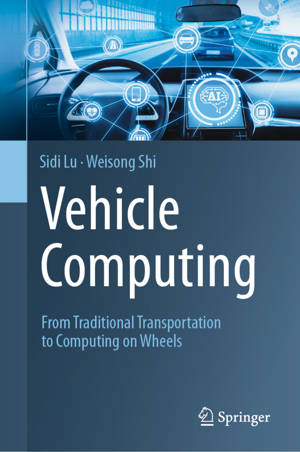
- Afhalen na 1 uur in een winkel met voorraad
- Gratis thuislevering in België
- Ruim aanbod met 7 miljoen producten
- Afhalen na 1 uur in een winkel met voorraad
- Gratis thuislevering in België
- Ruim aanbod met 7 miljoen producten
Vehicle Computing
From Traditional Transportation to Computing on Wheels
Sidi Lu, Weisong ShiOmschrijving
Over the past century, vehicles have predominantly functioned as a means of transportation. However, as vehicular computation and communication capacities continue to expand, it is anticipated that upcoming connected vehicle (CVs) will not only serve their conventional transport functions but also act as versatile mobile computing platforms. This book presents the concept of Vehicle Computing, encompassing five primary functionalities of CVs: computation, communication, energy management, sensing, and data storage. It proposes a potential business model and explores the challenges and opportunities associated with these domains.
Vehicle Computing serves as an important resource for the research community and practitioners in the field of edge computing and cyber physical system, capturing the essence of a rapidly changing industry, addressing the challenges and opportunities associated with connected vehicles (including software-defined vehicles, autonomous vehicles, electric vehicles), machine learning, communication, sensing, data storage, energy management, and computer systems. It synthesizes the latest research and real-world applications, offering valuable insights to both academia and industry professionals.
Vehicle Computing covers topics such as:
- The fundamentals of Vehicle Computing, including its historical context and key components.
- Advanced communication and networking technologies for connected vehicles.
- Sensing and data acquisition techniques, including edge and cloud computing integration.
- Energy management and storage, focusing on electric vehicle infrastructure and vehicle-to-grid.
- Data storage and processing strategies for vehicular environments.
- Business models, opportunities, and challenges associated with Vehicle Computing.
- Real-world applications and case studies, highlighting best practices and future trends.
Specificaties
Betrokkenen
- Auteur(s):
- Uitgeverij:
Inhoud
- Aantal bladzijden:
- 242
- Taal:
- Engels
Eigenschappen
- Productcode (EAN):
- 9783031599620
- Verschijningsdatum:
- 9/07/2024
- Uitvoering:
- Hardcover
- Formaat:
- Genaaid
- Afmetingen:
- 156 mm x 234 mm
- Gewicht:
- 530 g

Alleen bij Standaard Boekhandel
Beoordelingen
We publiceren alleen reviews die voldoen aan de voorwaarden voor reviews. Bekijk onze voorwaarden voor reviews.












